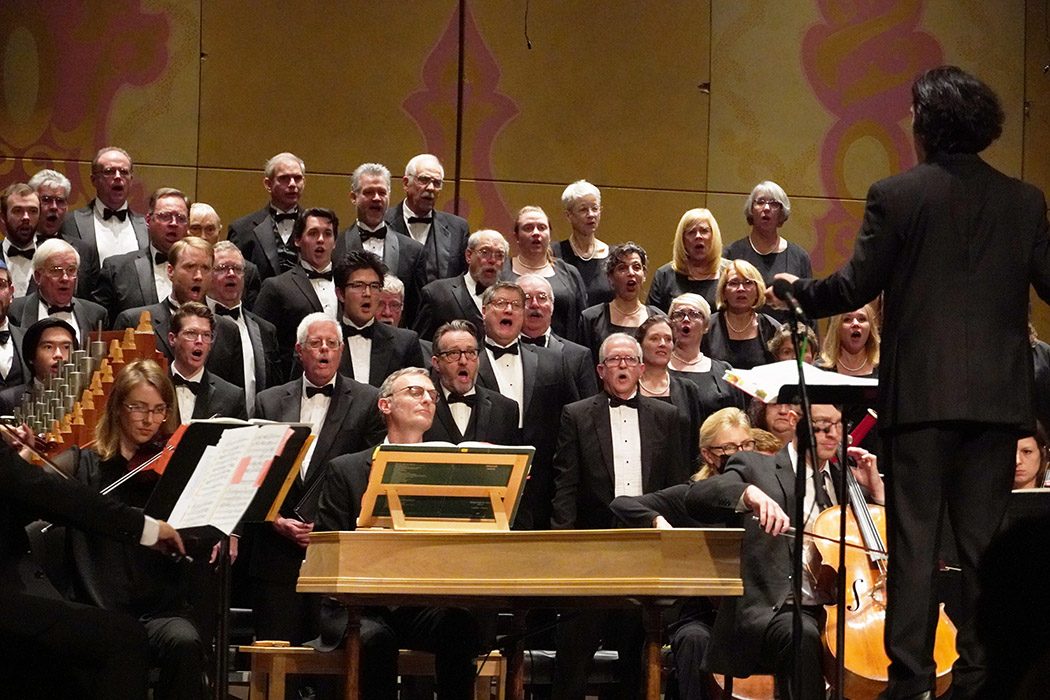Believe it or not, it has only been since 2015 that the Knoxville Symphony Orchestra has marked the beginning of its busy holiday season with a “Classical Christmas” offering for its late-November Chamber Classics Series concert. The idea at that time, if I understand it, was to leave extreme “holiday favorites” to other occasions, such as the Clayton Holiday Concerts, and offer lesser-known, but intriguing works from the repertoire of wintertime and Christmastime music. As we noted in 2017, the concerts had begun to be very popular sell-outs in the Bijou, even with programs that avoided the usual and familiar carols and offered a little bit of everything else—from parodies and comedy, to Tchaikovsky and Berlioz, from a gamut of choral works by John Rutter to Morten Lauridsen.
It seemed strange that a rather obvious candidate work for a Christmas season concert was always missing year after year: Victor Hely-Hutchinson’s A Carol Symphony. The delightfully charming four movement work has something of the classical form, rather than being a mere medley of tunes. Each movement is based on carols that have traditional roots rather than contemporary ones. I have always assumed its length at roughly 25 minutes was the reason for its absence from programs.
However, KSO maestro Aram Demirjian found a perfect spot for A Carol Symphony on this season’s “Classical Christmas” — the opening act for a performance of George Frideric Handel’s oratorio, Messiah. No surprise here, the KSO sold out this past Sunday afternoon’s performance at the Tennessee Theatre a week in advance.
Interestingly, the history of Messiah as a Christmastime offering, rather than Easter, is specific to the United States. In 1817, the newly formed Handel and Haydn Society of Boston, a large amateur effort, gave a Christmas day performance of Messiah with a huge chorus and orchestra. The tradition seemed to make sense for many, so it stuck—at least with performances of Part I plus Part II’s “Hallelujah Chorus,” the scheme used here.

Demirjian took an enjoyably energetic tempo in the opening Sinfonia, setting the stage for appropriately massaging the tempi throughout. Of course, large choral forces can be a factor in both tempo and ensembleness, but the Knoxville Choral Society, joining the KSO for this Messiah performance, provided a clean and relatively nimble presence for such a sizable group. The quartet of soloists—three of them already familiar to Knoxville audiences—projected solid vocal power and distinctly attractive phrasing marked by crisp diction for every listener in the theatre: soprano April Martin, alto Diana Salesky, tenor Tim Pope, and bass Michael Rodgers.
In addition to “If God be for us”, a soprano aria from Part III, the traditional “Christmas Version” generally includes the bass aria “The trumpet shall sound.” In this case, the rich bass of Michael Rodgers was augmented by KSO principal trumpet Chase Hawkins. Hawkins did not disappoint with his usual crystalline tone on the trumpet obligato and the ear-catching embellishments.
Needless to say, Knoxvillians will probably have other opportunities to hear Messiah or, at least, the obligatory “Hallelujah Chorus” this season. However, it is doubtful that they’ll hear another one so skillfully prepared and performed, or one so dramatically effective.









I’m not at all surprised that this group performed so well. They’re a Knoxville Gem.